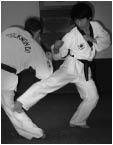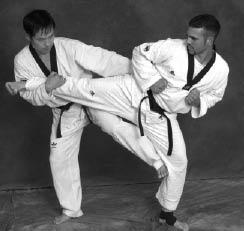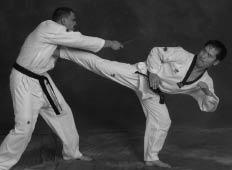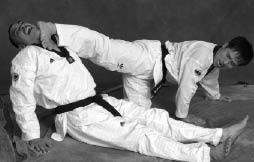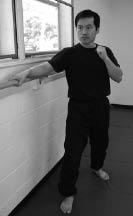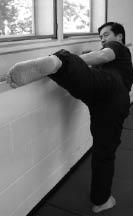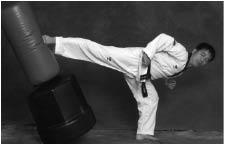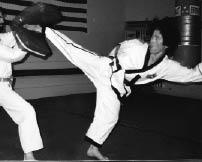Complete Kicking (10 page)
Authors: Turtle Press

A side kick to the rear of the opponent’s lead leg is a quick and easy way to knock him to his knees.
When you catch or trap an opponent’s kicking leg, throw a low side kick to the upper calf to take him down.
Use the long reach of the side kick to ward off an opponent with a weapon.
If you’ve fallen or been thrown to the ground, quickly throw a side kick into the rear of the assailant’s knee to knock him down and away from you.
Side kick can also be used when both fighters are on the ground.
SIDE KICK: TOES UP OR DOWN?
For maximum power, your toes should be lower than your heel when you perform a side kick. This creates a slight downward turn to your kicking foot and drives your heel into the target. It also aligns your body weight directly behind your kick and aids in balance. If your foot is not turned slightly downward on impact, you might be unbalanced backward by a stronger opponent or an opponent who resists by throwing his weight forward into you. It is easier to turn your foot downward when you completely rotate your hips.
common mistakes
MISTAKE 1: Curved body or hip sticking out to the rear.
SOLUTION: The key to power in the side kick lies in precise body alignment. Don’t let your hip leave the force line of the kick. Stretch your body fully so that your torso, hip, knee and foot are aligned on the same plane.
MISTAKE 2: Dropping the head.
SOLUTION: Look at the target over your kicking side shoulder.
MISTAKE 3: Kicking too high.
SOLUTION: For practical applications, side kick should be powerful and a kick that’s too high can lack power because your body is no longer behind the kick. Choose a realistic target height.
• remember
1. Align your hip, knee, and foot, and kick along the shortest path to the target.
2. Rotate your hip fully for power.
3. Strike the target with the blade or bottom of the foot.
4. Lower the toes slightly below the heel to enhance power and balance.
• avoid
1. Dropping your head or taking your eye off the target
2. Kicking too high for the situation
3. Curved body alignment, hip sticking out to the rear
one thought one action drill
Although every technique has multiple stages of execution, you should do each kick as a single action without separation in time and motion. In the beginning, this will be very hard; it might even seem impossible. But there are many exercises and drills you can use to develop muscle memory and reach the single action stage: visualization, kicking at the stretching bar, practicing with a handheld or suspended target, doing timed target kicking drills (how long does 5 kicks take? 10?), shadow sparring and incorporating kicks into sparring, self-defense or forms practice routines. Finally, ultimately, try to skip the thought process of bringing your knee up, rotating the body to the side, looking at the target, etc. Just kick. Fast.
Hold the stretching bar and visualize the motion of side kick before you kick.
Kick, internalize the process, and adjust your posture. Repeat at least 50 times a day on each side to develop muscle memory for every new kick you learn.
FOR A GREAT KICK:
1. Learn, understand and internalize the mechanics of the technique.
2. Aim at a target of a reasonable height and distance.
3. Kick fast. A fast kick provides you with less time to think and analyze, so your body naturally adjusts and controls itself.
Penetrating force
Kicking power comes from the combination of your body weight, the speed of the kick, and the distance covered. Since your body weight is constant, it is important to increase your kicking speed and to release your kick into the target to the fullest extent possible. Think of kicking several inches behind the target, into the center of the heavy bag or behind your opponent’s body. Strive for penetrating force, not pushing force, by releasing the full weight of your body into the target at impact.
Aim for a target that is several inches behind the one you want to strike and stretch your kick to the fullest.
Explosive penetrating force causes the target to collapse rather than be pushed away. Imagine the effect on a human torso.
Other books
Bun for Your Life by Karoline Barrett
Invisible by Lorena McCourtney
A Thread of Truth by Marie Bostwick
Breath of Life by Sara Marion
Allison (A Kane Novel) by Steve Gannon
The Nonexistent Knight by Calvino, Italo
High Master of Clere by Jane Arbor
Jekel Loves Hyde by Beth Fantaskey
Calling Me Back by Louise Bay
Nanny Behaving Badly by Jarvie, Judy
